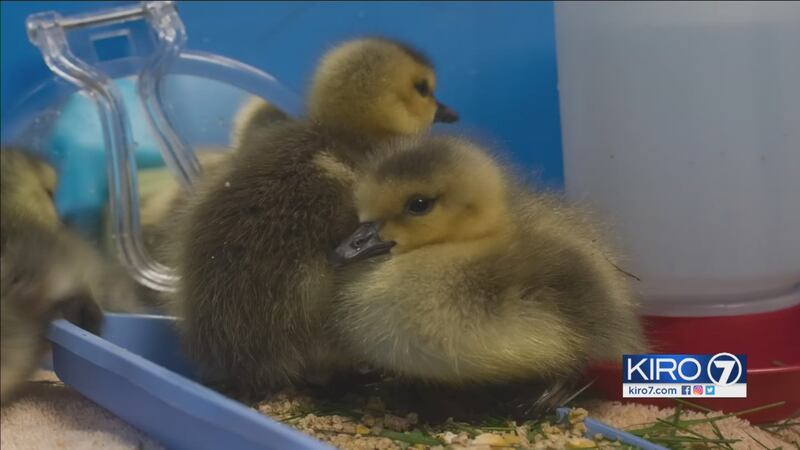LYNNWOOD, Wash. — Starting right around April first the phone at PAWS in Lynnwood spends very little time on the receiver and people like Kelcy Tiger show up at the wildlife center doorstep in abundance.
Kelcy found a pair of baby geese outside the Newcastle library.
“It looked like someone had lifted them up into that space, maybe the mom, maybe they fell off the roof because there’s roof access there that’s not really high up and there was some blood so we thought maybe something had happened to the mom,” Kelcy told us.
She called PAWS before she intervened, and that’s the message the non-profit wants to spread during spring baby season.
From now until the end of summer they field as many as 60 calls a day and house as many as 300 animals at any given time.
“Bunnies, squirrels, and songbirds are the most common species that we get but we take over 100 different species of wild animal,” explained Katelynn Overton, the Wildlife Admissions Specialist at PAWS.
Scroll down to continue reading
More news from KIRO 7
- 4 dead, 4 injured after crane collapsed on several cars in South Lake Union
- Wife identifies husband as ironworker killed in Seattle crane collapse
- Seattle crane collapse: Details about the victims, survivors
- Investigation underway as officials try to determine what caused fatal crane collapse
- Do you have an investigative story tip? Send us an email at investigate@kiro7.com
Many babies like the goslings Kelcy brought in do need help but just as many don’t; Like young songbirds who spend nearly two weeks on the ground before they’re strong enough to fly.
“People will often pick up fledgling birds they find on the ground and bring them in and we look them over and they look fine and we get information from the finder that mom was around, she was taking care of them,” Katelynn said.
In those cases she tells the finder to take the baby back to the nest.
“I think it’s kind of a myth out there that if you touch a wild animal the mom will reject it—that’s not always the case,” Katelynn continued.
So re-nesting is okay, but removing or moving the nest is not.
“Any time you move a nest the mom isn’t going to know where to look for those babies anymore and that’s when they become orphaned,” Katelynn said.
Kelcy did everything right when it came to her geese. Now they’ve been grouped with another gosling and will likely be just fine.
“It’s so nice to have a resource like this to be able to lean on and bring them here an ensure they’re properly cared for,” Kelcy concluded.
If you have questions about a wild animal you've come into contact with, call PAWS at 425-787-2500 or stop by their wildlife center at 15305 44th Ave West, Lynnwood.
They are open from 8 a.m. until 8 p.m.
Cox Media Group







